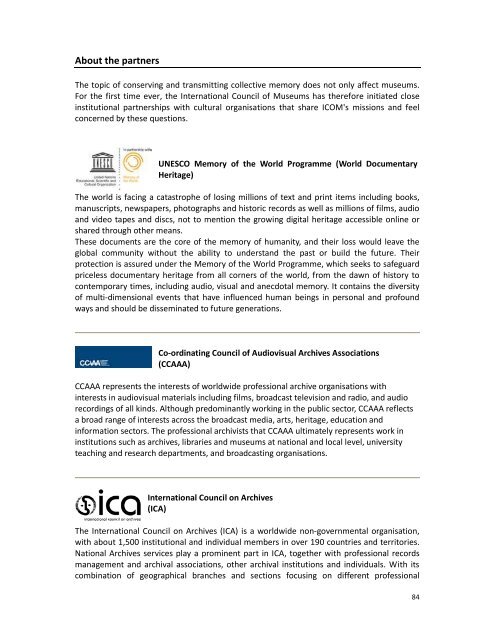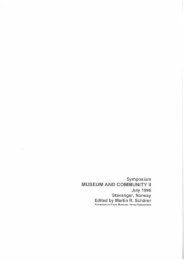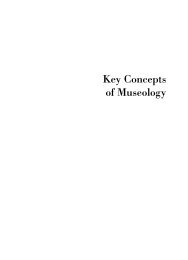press kit - The International Council of Museums
press kit - The International Council of Museums
press kit - The International Council of Museums
You also want an ePaper? Increase the reach of your titles
YUMPU automatically turns print PDFs into web optimized ePapers that Google loves.
About the partners<br />
<strong>The</strong> topic <strong>of</strong> conserving and transmitting collective memory does not only affect museums.<br />
For the first time ever, the <strong>International</strong> <strong>Council</strong> <strong>of</strong> <strong>Museums</strong> has therefore initiated close<br />
institutional partnerships with cultural organisations that share ICOM's missions and feel<br />
concerned by these questions.<br />
UNESCO Memory <strong>of</strong> the World Programme (World Documentary<br />
Heritage)<br />
<strong>The</strong> world is facing a catastrophe <strong>of</strong> losing millions <strong>of</strong> text and print items including books,<br />
manuscripts, newspapers, photographs and historic records as well as millions <strong>of</strong> films, audio<br />
and video tapes and discs, not to mention the growing digital heritage accessible online or<br />
shared through other means.<br />
<strong>The</strong>se documents are the core <strong>of</strong> the memory <strong>of</strong> humanity, and their loss would leave the<br />
global community without the ability to understand the past or build the future. <strong>The</strong>ir<br />
protection is assured under the Memory <strong>of</strong> the World Programme, which seeks to safeguard<br />
priceless documentary heritage from all corners <strong>of</strong> the world, from the dawn <strong>of</strong> history to<br />
contemporary times, including audio, visual and anecdotal memory. It contains the diversity<br />
<strong>of</strong> multi-dimensional events that have influenced human beings in personal and pr<strong>of</strong>ound<br />
ways and should be disseminated to future generations.<br />
Co-ordinating <strong>Council</strong> <strong>of</strong> Audiovisual Archives Associations<br />
(CCAAA)<br />
CCAAA represents the interests <strong>of</strong> worldwide pr<strong>of</strong>essional archive organisations with<br />
interests in audiovisual materials including films, broadcast television and radio, and audio<br />
recordings <strong>of</strong> all kinds. Although predominantly working in the public sector, CCAAA reflects<br />
a broad range <strong>of</strong> interests across the broadcast media, arts, heritage, education and<br />
information sectors. <strong>The</strong> pr<strong>of</strong>essional archivists that CCAAA ultimately represents work in<br />
institutions such as archives, libraries and museums at national and local level, university<br />
teaching and research departments, and broadcasting organisations.<br />
<strong>International</strong> <strong>Council</strong> on Archives<br />
(ICA)<br />
<strong>The</strong> <strong>International</strong> <strong>Council</strong> on Archives (ICA) is a worldwide non-governmental organisation,<br />
with about 1,500 institutional and individual members in over 190 countries and territories.<br />
National Archives services play a prominent part in ICA, together with pr<strong>of</strong>essional records<br />
management and archival associations, other archival institutions and individuals. With its<br />
combination <strong>of</strong> geographical branches and sections focusing on different pr<strong>of</strong>essional<br />
84
















